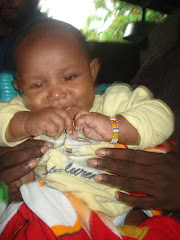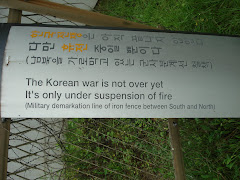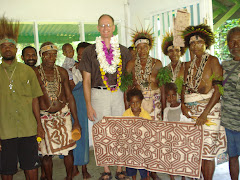Report of the Minister General SSF
First Order Chapter August/September 2008
Stroud, NSW, Australia
Going around the world, staying with the brothers, I have been privileged to hear many stories. I have found that a large part of my job is to listen to brothers. Sometimes I may have to pursue them and get them to talk. Nevertheless storytelling is not just about information sharing. It is about creating relationships. We sit, we talk, and I take their photograph. These budding relationships are the necessary conditions for the conversion of my life and (I pray) for lasting Gospel work. Was it Simon of Stylites who said the ear is the organ of conception? Something has been touched in me; it’s growing! And I want to share with you some of my reflections on all this listening I have been doing.
First, the mise en scene: good stories need to be connected to time and place. I have heard incredible stories told on verandahs chewing betel nut, standing in the courtyard of Hilfield drinking tea, sitting around the fire at Alnmouth, in the dining room of Haruro where I heard about how a pig was killed in a night-time hunt for our dinner, over meals in restaurants. Brothers told stories on the San Francisco MUNI, ferries on the Solomon sea, automobile drives across the moors of southern England, bathing in a warm tropical river: stories about the early days in SSF, the stories of the first SSF brothers in PNG, the brothers response to the disaster in Papua New Guinea, the building of Stroud brick by brick on land slated for a garbage dump, the moving of the friary building in Auckland; stories of how brothers died, stories about the SSF participation in the Solomon Islands peace making efforts, testimonials about praying for peace in Northern Ireland; reminiscences of Algy bringing the early communities together, of Bill Lash and his driving (and his equally remarkable leadership in India), of brothers working on the docks in the East End of London; these were added to stories I already knew about Fr. Joseph, the early days of San Damiano, the Orange City friary, the Minneapolis friary, the Navajoland mission, Dunstan’s VW bug, the early days of Little Portion. I heard stories again about the 1982 chapter and the re-founding of the American Province. I have heard literally hundreds of stories about brothers’ school days, their decision to become brothers, their family’s reactions, their own experience of community life and what keeps them in community. Francis reached beyond the grave, and I have been reading his stories on-line. Some talk of the community with gratitude, some have an attitude. My brothers and their stories are an enormous gift and joy to me. They have been a kind of SSF Fioretti. Our Franciscan stories are exotic: just thinking of all the places we are, and have been, makes me a bit giddy. These Franciscan tales are deeply grounded in the peripheries of the world power structures, and they are about non-famous people (I almost said “ordinary” but that would be disingenuous). Many of these stories are about moments when the storyteller felt particularly alive or connected to the Franciscan story, or sometimes moments of terrible doubt or sadness that took him to places inside himself that became in retrospect places of great blessing through the alchemy of God’s grace.
The stories we tell are not only the treasures that we offer each other in love and trust and intimacy, but they are the charter for our future. They are the living link between bad times and good, the testimonial of God’s blessing in our life as a community so that we will have the confidence to face the difficult days as they dawn on us knowing we are in a great company. There never was a day in SSF when everything was perfect; we’ve always been responding to God’s grace-in-the-moment.
We all have different stories and yet we have a common hope. This is the thing that is growing in me: hope for us and for our mission to live and share the Gospel. There is living in each of us the hope of our calling, to live a life of love and joy, serving people in the name of Jesus Christ. Our hope is rooted in St. Francis. The Franciscan stories have inspired, agitated and troubled us in many different ways. We go back to these stories as we tell our stories, finding ways to frame our experience. A brother once told a story about overcoming his fear of meeting lepers by remembering how Francis embraced the leper and encountered Christ. So the story from the Franciscan tradition helped re-frame a story of fear into a story of joy and liberation. As storytellers we can unleash the power others feel as they struggle to find ways to honor that strange feeling they have to make a difference, serve God, doing something beautiful, share their healing with fellow sufferers: whatever, it is different for each of us. Stories in which we share a bit of our own foolishness or failure often connect more deeply with people than when we brag about our accomplishments. At least it is true for me because other people’s accomplishments often leave me feeling a bit flattened, wondering what I’ve been doing with my life while they have written 10 books, taught important classes, fought huge battles. Because of the intimacy created when we sit down to tell our stories, we are in a privileged relationship with each other. The stories we tell frame our memories and foster the future.
As Anglicans most of us are still sifting through the story of the Lambeth Conference. What emerged for me from the conference was the importance of reaching out and engaging other people, especially the ones we feel most threatened by; again Franciscan stories come to mind: Francis and the Sultan, Francis and the Wolf of Gubbio. Relationships are converting. Let me tell you a story: remember how the Sudanese bishops issued a statement and gave a press conference calling for Bishop Gene Robinson’s dismissal and/or breaking communion with the Episcopal Church. I kept thinking about this, and it really bothered me. I’d find myself gritting my teeth as I walked along, imagining all the things I’d do or say to one of those Sudanese bishops. One day I remembered Francis with the Sultan, and decided I too should meet my so-called enemy. Maybe he’d welcome gay people after he met me. So we met, and at first it didn’t go well. Then he said we should pray about it. I immediately grabbed his hand. After praying with this Sudanese bishop and holding his hand while we prayed, I found I couldn’t hate the man. I imagined him saying Mass, blessing people, eating his food: a lovely gentle human being. A huge burden was taken off of me and I suddenly could see that no matter what the long term outcome of the conference, God was there at Lambeth, bringing people together, healing wounds, and opening different channels of communication. Francis never stopped or prevented a war, but his example still has the power to agitate me into seeking God’s help to change my life—over and over again, a day at a time.
Stories provide a glimpse of the immensity of the world and give us a reminder that our life, our individual lives are not the measure of all things. Does God have an over- arching plan? Or is it enough that God is with us, funding our imaginations with innumerable, sacred stories and providing the true measure of love and sacrifice and joy as we negotiate our way through life?
I say all this to suggest that I see us, in the context of the world today, as people of the story. Troubadour is a Franciscan image. The way the brothers reach out, opening their lives to each other and to the world is an expression of strength through vulnerability; as St. Paul reminds us, God’s strength is made perfect in human weakness. If we can get people to listen to us and care about what we are saying we are well on the way to unleashing Gospel power in the world.
The underside of our stories is a widespread sense of inadequacy. We agonize about our life, our commitments and our failures. We think we should be doing more, that we don’t live the Franciscan life fully enough, that other people are doing it better, we think our trouble with English disqualifies us, or that because people expect certain things of us we should try to meet their expectations: but we just can’t! It is a classic case of judging our insides by others’ outsides—judging how we feel by how other people appear to us. In many cases this comparison can be very debilitating and vocation destroying. Of course we all have much to learn and there is room for improvement in all of us. But if we could only begin to look at our attributes with gratitude we could become even stronger in our Franciscan identity and witness. Instead of thinking we are too old, sick, uneducated, lacking in formation, too young, or inexperienced, I wonder what would happen if we began to consider what God might require of a grateful old man like me, a village boy like me, a new Christian convert like me, a Catholic priest like me? Each and every one of us has inside himself all he needs to have an amazing ministry. When he adds it to the gifts of his brothers, our community has all it needs at this very moment to give full expression to the Franciscan charism. We don’t need any more schooling—though schooling is always a good thing. Our formation is adequate to touch the hearts of men and women with the love of God, though we are all of us engaged in a life long process of formation. Each of us has a gift or ability that the community as a whole needs. God did not call any of us as potentially useful brothers, or eventually adequate ones. No! Right now, each and every one of us carries the Gospel, our piece of it. When we share it, God often writes another chapter of it in our hearts, so the story becomes bigger.
The negative stories we tell ourselves are not humility. They are bullets in the foot, wounds that can incapacitate us. But who thinks he is being negative when he airs a long held grievance? The only ways in which to hear the story we tell ourselves is to try and take a step back and see if we are living the life we feel called to live. Does your life seem boring, unimportant, and mechanical (add your favorite adjective)? We make these judgments because we have another, punishing story in our minds that says “I am boring, unimportant, and unimaginative.” Or we say: “I have to live this way, because if I don’t do ‘x’ nobody else will, and then something else won’t happen, …. and eventually civilization as we know it will collapse (hyperbole added to evoke the compelling nature of compulsive thinking patterns).” I hear versions of these stories in every friary.
What then is a brother to do? He can talk to somebody and try to get a different perspective. One writer has put it: “unhappiness can stem from having only one perspective to play with.” My greatest obstacles have been overcome by asking my brothers what they think of a situation. Sometimes they have just laughed at me, and I realized the problem was only in my head. Other times we shared a concern and found a new way of looking at things.
A case in point: our future as an order is one of those big problems or obstacles that seems to live among us. At one chapter meeting I sat in on a group that talked about the death of SSF at great length. Finally I said perhaps that province was going through difficult times, but certainly in other provinces the issues are about welcoming and forming many new brothers. The difference in perspective is more than just interesting. It describes the work before us. How do we work with the different population statistics of our provinces? We are an international order. Like the Anglican Communion as a whole, SSF has more brothers in the global south than in the north, in developing nations than in developed nations. The stories of the brothers contain the evidence we need to discover the way forward. Listening to the reports, listening to each other in chapel, at meals and in the down times, I wonder if we can hear the voice of God calling us to new risks, new ventures, and new ways of being human no matter where we live? What is the gift in our diverse community that can help us all?
When the brothers told the spouses at Lambeth about the joint efforts of the religious communities to bring peace to the Solomon Islands, those people nearly jumped through the roof. The important factor for me was that every brother and sister was considered part of the effort, not just those who dodged bullets. The idealism, joy, increased sense of hope and commitment, the power unleashed by their story had an enormous impact not only on those people in the room at Lambeth, but through them on the world. Can we see everything we do as part of the story of the peace effort, part of the effort to heal the earth? It is not just a turn of phrase, but an attitude, a value.
Much of our reason for being as an order is to be in relationship with the marginalized in the world, and to strengthen the Christian faith and commitment of people we meet, sparking their creativity, expanding the circle of friends and colleagues and partners in the Gospel life and ministry. We have Franciscan connections in Zimbabwe, a place of strife and uncertain future; in Brazil and the Coral Triangle of the South Pacific, two of the environmentally key areas of the globe; we have Franciscan connections in USA and Europe and Asia. Multiply these few connections by the number of First Order Sisters, Poor Clares, and members of the Third Order, square this number with our ecumenical contacts among other Franciscans, Franciscans International and other NGO’s and the result is… (Math was never my strong point, but you get the picture). We must stop telling ourselves we can’t do something. Listen to the story God is telling us: we exercise a tremendous influence, and can do so even more.
Listen to your hearts, listen to each other, and listen to God. Give thanks for what God has done in your life, and what God is doing among your brothers. God has prepared an audience for us; tell the good news wherever you go!


























